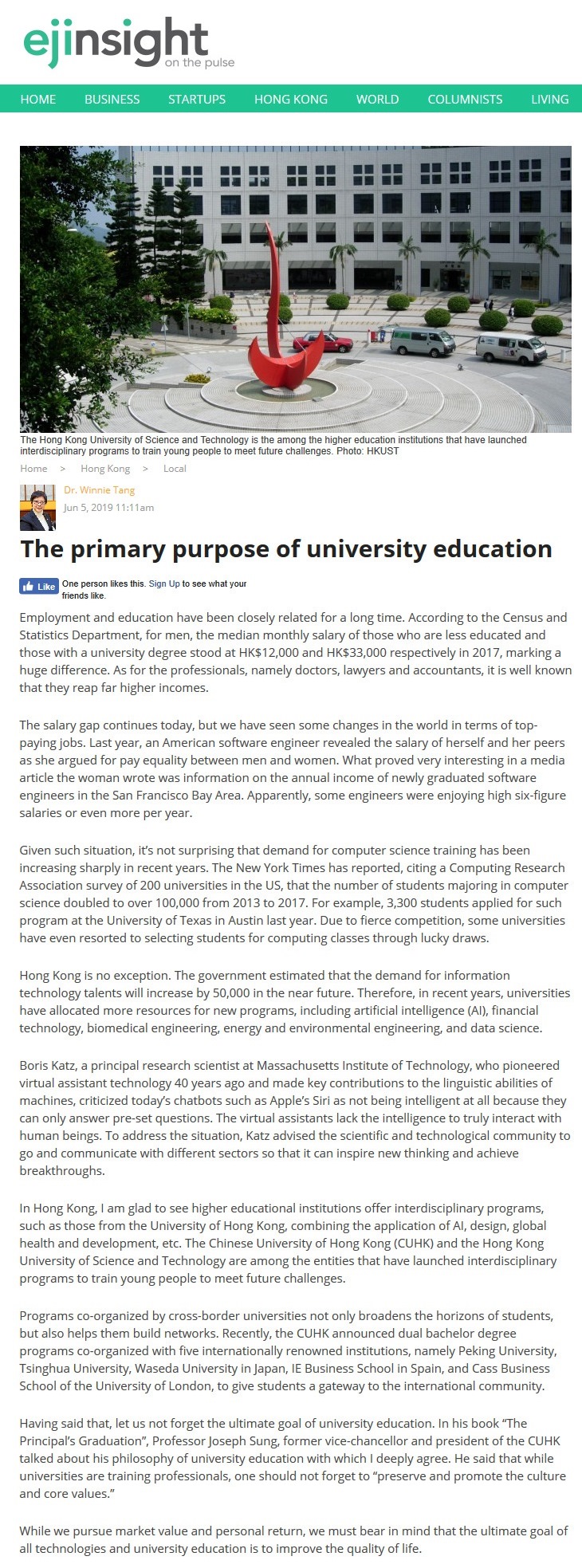網上版請按此

The primary purpose of university education
Employment and education have been closely related for a long time. According to the Census and Statistics Department, for men, the median monthly salary of those who are less educated and those with a university degree stood at HK$12,000 and HK$33,000 respectively in 2017, marking a huge difference. As for the professionals, namely doctors, lawyers and accountants, it is well known that they reap far higher incomes.
The salary gap continues today, but we have seen some changes in the world in terms of top-paying jobs. Last year, an American software engineer revealed the salary of herself and her peers as she argued for pay equality between men and women. What proved very interesting in a media article the woman wrote was information on the annual income of newly graduated software engineers in the San Francisco Bay Area. Apparently, some engineers were enjoying high six-figure salaries or even more per year.
Given such situation, it's not surprising that demand for computer science training has been increasing sharply in recent years. The New York Times has reported, citing a Computing Research Association survey of 200 universities in the US, that the number of students majoring in computer science doubled to over 100,000 from 2013 to 2017. For example, 3,300 students applied for such program at the University of Texas in Austin last year. Due to fierce competition, some universities have even resorted to selecting students for computing classes through lucky draws.
Hong Kong is no exception. The government estimated that the demand for information technology talents will increase by 50,000 in the near future. Therefore, in recent years, universities have allocated more resources for new programs, including artificial intelligence (AI), financial technology, biomedical engineering, energy and environmental engineering, and data science.
Boris Katz, a principal research scientist at Massachusetts Institute of Technology, who pioneered virtual assistant technology 40 years ago and made key contributions to the linguistic abilities of machines, criticized today's chatbots such as Apple's Siri as not being intelligent at all because they can only answer pre-set questions. The virtual assistants lack the intelligence to truly interact with human beings. To address the situation, Katz advised the scientific and technological community to go and communicate with different sectors so that it can inspire new thinking and achieve breakthroughs.
In Hong Kong, I am glad to see higher educational institutions offer interdisciplinary programs, such as those from the University of Hong Kong, combining the application of AI, design, global health and development, etc. The Chinese University of Hong Kong (CUHK) and the Hong Kong University of Science and Technology are among the entities that have launched interdisciplinary programs to train young people to meet future challenges.
Programs co-organized by cross-border universities not only broadens the horizons of students, but also helps them build networks. Recently, the CUHK announced dual bachelor degree programs co-organized with five internationally renowned institutions, namely Peking University, Tsinghua University, Waseda University in Japan, IE Business School in Spain, and Cass Business School of the University of London, to give students a gateway to the international community.
Having said that, let us not forget the ultimate goal of university education. In his book "The Principal's Graduation", Professor Joseph Sung, former vice-chancellor and president of the CUHK talked about his philosophy of university education with which I deeply agree. He said that while universities are training professionals, one should not forget to "preserve and promote the culture and core values."
While we pursue market value and personal return, we must bear in mind that the ultimate goal of all technologies and university education is to improve the quality of life.
Dr. Winnie Tang
Adjunct Professor, Department of Computer Science, Faculty of Engineering and Faculty of Architecture, The University of Hong Kong